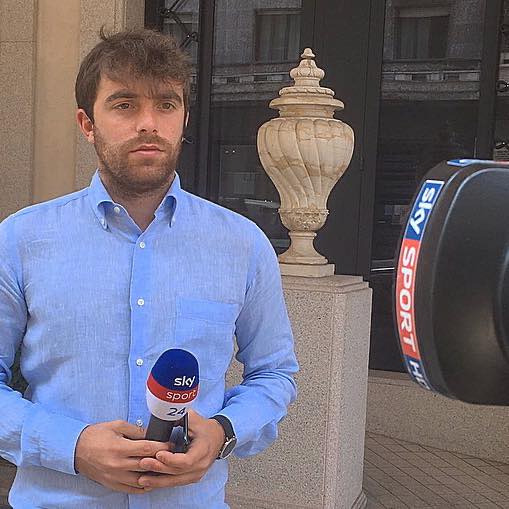في كل يوم، يخوض فابريزيو رومانو معركة مُطاردة أخبار انتقالات لاعبي كرة القدم، خاصة خلال شهر يناير/ كانون الثاني وفصل الصيف حيث يُفتح الباب لتسجيل اللاعبين الجدد. تظل عيناه طيلة ساعات اليوم تقريبا وأيام الأسبوع مُعلّقتان بشاشة الهاتف، تأهباً لاستقبال أنباء حصرية تَهُمُّ حركة اللاعبين بين الأندية ونشرها، ويتم ذلك طبعا بعد "تدقيقها وتمحيصها والتحري حولها من شبكة مصادر واسعة".
لم يكن من الحتمي استهلال هذه المقالة بمعلومات تعريفية عن رومانو، بل إلقاء الضوء على ما يُثير فضول الكثيرين بشأن عوامل نجاح هذا الإعلامي الإيطالي ومُقارباته في العمل. الشاب الذي لا يتعدَّى عُمره الـ 30 سنة بات يُضاهي نجوم كرة القدم شُهرة وانتشاراً، إذ يُتابعه عشرات الملايين من المُهتمين على منصات التواصل الاجتماعي، جاعلاً من نفسه علامة مُسجّلة ومقترنة بالموثوقية والمصداقية في عالم سوق الانتقالات أو ما يُعرف بـ "الميركاتو".
"آمل أن يتفهَّم كل أصدقائي تحديقي في الهاتف طيلة 24 ساعة وعلى امتداد أيام الأسبوع، حتى لو كنا نتناول العشاء، لأن كل رسالة وكل مكالمة، ليست مجرد عمل أو كرة قدم بالنسبة لي، إنها حياتي بكل بساطة" (1)، يتحدث هنا رومانو عن الشّغف والتضحية كصفتين يجب أن يتسلَّح بهما الصحفي خاصة الرياضي.
يتربَّع الشاب الإيطالي حالياً على عرش الصحفيين الرياضيين الأكثر تأثيراً على مستوى العالم، حيث أضحى مرجعاً بالنسبة للمهتمين وبوصلةً لهم لمواكبة ما يُستجدّ في سوق الانتقالات على مدار الساعة واليوم. وهنا يجدر التساؤل عن مكامن قوة رومانو في تكثيف المصادر ونسج علاقات معهم بما يسمح له في الحصول على "السّبق الصحفي" في أغلب الأحيان؟ وما هو أسلوبه في العمل وعلى ماذا يقوم من حيث المبادئ والوسائل؟

فن التعامل مع المصادر
كان رومانو منذ بداية مساره الإعلامي على دراية بأهمية المصادر الصحفية، لذلك ركّز جهوده على محاولة توطيد العلاقة معهم وكسب ثقتهم، لكنه دخل غِمار هذا التحدّي مُستعيناً بصفات إنسانية قائمة على الاحترام والصّدق والوضوح، ويتحدث الإيطالي عن ذلك قائلا:
"الاحترام هو كلمة السّر، أن تحترم مصادرك ولا تُسبّب لهم أية إشكالات وأن تحترم كذلك متابعيك بتزويدهم بأخبار موثوقة" (2).
لا يُخفي رومانو جدوى الجُرعة الإنسانية التي يجب وضعها في العلاقة مع مصادره سواء وكلاء الأعمال أو اللاعبين والمدربين أو مسؤولي الأندية، وينكب تبعاً لذلك على إبقاء خط التواصل قائماً معهم بشكل دوري ومنتظم، متفادياً ربط الاتصال بهم في فترات "الميركاتو" فقط أو حينما يرتفع عليهم الطلب من الصحفيين الآخرين للحصول على المستجدات.
لا يُخفي رومانو جدوى الجُرعة الإنسانية التي يجب وضعها في العلاقة مع مصادره سواء وكلاء الأعمال أو اللاعبين والمدربين أو مسؤولي الأندية.
أبصر رومانو النور في مدينة نابولي، ثم أمضى دراسته الجامعية بميلانو، حيث يستقر لحدود الآن، ومن هناك دشّن مسيرته الإعلامية، وقد أفنى أكثر من ثماني سنوات حسب قوله وهو يجوب أرجاء المدينة لمحاولة رصد اجتماعات الفاعلين في كرة القدم من وكلاء أعمال ومسؤولي الأندية، حتى يظل على اطلاع على جديد الصفقات ويبني العلاقات معهم.
"أدركت أنني كنت أود أن أكون صحفياً في سنٍّ مُبكِّرة، لأنني أحببت كرة القدم بجنون، وفي سن السادسة عشر خُضت تجربتي الأولى مع موقع رياضي صغير، وحينذاك عرفت أن هذا هو طريقي ومسلكي" (3)، يحكي الصحفي الإيطالي عن بداياته في المهنة، ويستحضر كذلك الدور الذي اضطلع به والده في تقريبه من كرة القدم، كونه كان بدوره مُحباً ومهووساً بهذه اللُّعبة.
يُطوِّق فابريزيو مصادره بسياجٍ من السّرية، ويضمن لهم الخصوصية مهما حدث، في قاعدة أساسية تنبني عليها الممارسة الصحفية، ويُصرّح في هذا الإطار: "لدي علاقات إيجابية مع وكلاء الأعمال والمديرين الرياضيين للأندية ومصادر أخرى لا أستطيع البوح بهويتها، كل شيء يقوم على الثقة المُشتركة".
لا زال فابريزيو يتذكّر عن ظهر قلب أول "سبق صحفي" حصل عليه ونشره، كان مُتعلّقاً بالنجم الأرجنتيني ماورو إيكاردي، حينما كان في أكاديمية "لاماسيا" التابعة لنادي برشلونة. في صيف 2011، أعلن رومانو أن إيكاردي سيُغادر النادي الكتالوني نحو سامبدوريا الإيطالي، وهو الخبر الذي ذاع على نطاق واسع ويعتبره صاحبه من أبرز الحصريات التي حصل عليها.
لكن قبل أن يحظى الإيطالي بهذا الإنجاز، كان لزاما عليه أن ينال ثقة وكيل الأعمال الذي يتحفَظ رومانو عن ذكر هويته، والذي زودَّه بهذا "السّبق الصحفي"، حيث طلب منه هذا الأخير تحرير مقالة من جنس "البورتريه" عن إيكاردي ولاعب آخر في "لاماسيا" آنذاك هو جيرارد دولوفيو. تم ذلك وحقّق وكيل الأعمال هدفه بتوقيع عقد مع اللاعبين لتمثيلهما في سوق الانتقالات.

التوظيف المثالي لمواقع التواصل الاجتماعي
فَطِن رومانو إلى المساحات التي تُوفِّرها منصات التواصل الاجتماعي وأَحْسَنَ الاستفادة من خصائصها. بدأ في موقع "تويتر" ثم وسّع من نشاطاته على مُختلف الوسائط الاجتماعية، ولم يكن لمسار الإعلامي الإيطالي أن يتّخذَ هذا المسلك بوتيرة سريعة لولا إدراكه لقوة هذه المنصات الافتراضية والمساعدة التي تُقدّمها على الانتشار.
يحوز فابريزيو حالياً أكثر من 16 مليون متابع على "تويتر"، وحوالي 18 مليون متابع على "إنستغرام"، إضافة إلى ما يفوق 11 مليون مُعجب على موقع "فيسبوك"، كما أنه يظل نشيطاً على منصات أخرى، إذ يُنتج فيديوهاته الخاصة على موقعيْ يوتيوب وتويتش. لقد جسَّد الإيطالي معنى "صحفي القُرب" الذي يُسجّل تواجده في كل الوسائط، مُستهدفاً بذلك جميع المهتمين على اختلاف المنصات التي يُفضِّلونها.
هذه الشعبية التي يتمتّع بها رومانو في المواقع الاجتماعية فتحت له آفاقا أوسع وضاعفت فرصه في الوصول إلى مصادر جديدة، إذ أصبح عُنصر جذب لكل الفاعلين الراغبين في ترويج أخبارهم وطرحها للعموم، خاصة وكلاء الأعمال الذين يسعون إلى تسويق لاعبيهم. كما تُعد منصات التواصل الاجتماعي بالنسبة إليه مصدراً تجعله مواكباً لما يعتمل داخل سوق الانتقالات، ونقطة انطلاق لإبراز تطورات ملفات سبقه صحفيون آخرون لإثارتها.
يقول ابن مدينة نابولي عن علاقته بالوسائط الاجتماعية: "كمثال، اعتدت في الأول على استخدام موقع أنستغرام استعمالا شخصياً فقط، كنت أنشر صورة للغروب أو توثيق عشاء جيد، لكن بعد ذلك، شرع المتابعون في التعليق على منشوراتي بطلب مستجدات أخبار الانتقالات، لا أحد كان مهتما بحياتي الشخصية، أنا لست نجما، أنا صحفي والصحفي هو وسيط وناقل".
كنت أنشر صورة للغروب أو توثيق عشاء جيد، لكن بعد ذلك، شرع المتابعون في التعليق على منشوراتي بطلب مستجدات أخبار الانتقالات، لا أحد كان مهتما بحياتي الشخصية، أنا لست نجما، أنا صحفي والصحفي هو وسيط وناقل.
ومن أبرز النجاحات التي يعتبر رومانو أنه حققها على مواقع التواصل الاجتماعي، كانت تلك المرتبطة برحيل الفرنسي زين الدين زيدان عن تدريب نادي ريال مدريد سنة 2021، كان أول من نشر الخبر وشكّل ذلك بالنسبة له مصدر اعتزاز بالغ، إذ يتحدث عن الأمر بقوله: "لقد كان خبرا حصريا خالصا، بدأت بعد ذلك في الاتصال بزملائي والتأكيد أمامهم بأنني أول من أثار خبر مغادرة أسطورة مثل زيدان لنادي ريال مدريد" (4).
أجاد فابريزيو قاعدة التوظيف الصحفي لوسائل التواصل الاجتماعي، وهو الآن من أبرز الوجوه في هذه المواقع، حتى إنه يفوق -على مستوى عدد المتابعين- نجوما بارزين، كما قدّم له كل هذا فرصة للترويج لبعض الشركات والحصول على عقود إعلانية، بالنظر إلى قوة التأثير الذي صار يملكه في المنظومتين الإعلامية والرياضية.

المهنية والتواضع
يؤمن رومانو رغم الانتشار الذي حقّقه بأخلاقيات الممارسة الصحفية، ويتجسَّد ذلك على سبيل المثال في لجوئه في بعض الأحيان إلى نشر أخبار حصرية استقاها صحفيون آخرون، ونسبها إليهم دون أدنى شعور بمركب نقص، في إطار التعاون الذي ينبغي أن يكون بين الزملاء الصحفيين في سبيل خِدمة العامّة والمتابعين.
يستحضر الإعلامي الإيطالي يدَ العون التي مُدّت إليه في بداياته بشبكة "سكاي سبورتس"، والتي قُدّمت له من طرف مواطنه جيانلوكا دي مارزيو، الذي يُعتبر بدوره من أبرز الصحفيين المختصين في أخبار انتقالات اللاعبين، ويعترف فابريزيو الذي كان مُساعداً لدي مارزيو في المؤسسة بذلك قائلاً: "إنه إعلامي خارق للعادة، لقد تعلّمت منه كل شيء".
التأثير الذي أضحى رومانو يملكه بلغ أقصى درجات القوة، إلى درجة أن الكثيرين باتوا يستخدمون لازمة "here we go" للدلالة على أن الصّفقة قد تمت، في محاكاةٍ لفابريزيو الذي اشتهر بها قبل سنوات، ويقول عن ذلك: "قبل سنوات خلت، كنت أنشر تحديثات حول إحدى صفقات مانشستر يونايتد على امتداد شهر كامل، ثم كتبت "here we go"، أي أن الصفقة قد اكتملت، ومنذ لك اليوم بدأ المتابعون يسألونني عن هذه اللازمة بشأن كل الصفقات، ويقولون لي هل بإمكانك كتابتها عن اهتمام برشلونة وأرسنال وليفربول ببعض اللاعبين؟"
في واقعة طريفة تعكس التشبيك الواسع لعلاقات فابريزيو مع مصادره، وصف اللاعب الياباني، مايا يوشيدا، الإعلامي الإيطالي بـ "الرجل الذي لا يُصدّق"، مُضيفاً: "حتى زوجتي لم تكن تعلم بأمر طرابزون سبور التركي". ويأتي ذلك بعدما كشف رومانو أن يوشيدا رفض عرضاً للتوقيع في كشوفات النادي التركي، مُفضّلاً الانتقال إلى صفوف شالكه 04 الألماني في الصيف الفارط (5).
في واقعة طريفة تعكس التشبيك الواسع لعلاقات فابريزيو مع مصادره، وصف اللاعب الياباني، مايا يوشيدا، الإعلامي الإيطالي بـ "الرجل الذي لا يُصدّق"، مُضيفاً: "حتى زوجتي لم تكن تعلم بأمر طرابزون سبور التركي"
مسّت درجة تأثير رومانو حتى أندية كرة القدم، ففي يناير/ كانون الثاني من سنة 2022، اختار نادي تورونتو الكندي الإعلان عن تعاقده مع الجناح الإيطالي، لورينزو إنسينيي مُستعيناً بلازمة "here we go" ومقطع فيديو يظهر فيه فابريزيو وهو يُردّدها، بعدما كان سباقاً إلى الكشف عن توصل أطراف الصفقة إلى اتفاق نهائي (6).
لكن رغم كل ما بلغه، يُحافظ صاحب الـ 30 سنة على تواضعه، مُعتبراً أنه من السّمات المطلوبة لجذب المصادر وتكثيف العلاقات وكذلك لرسم سمعة طيبة وسط المتابعين. يقول هنا رومانو: "أعتقد أنه من الصواب أن أتذكّر أنني مُجرد صحفي وأن كرة القدم مجرد لعبة. أولئك الذين لديهم القوة والضغط حقا هم الذين يقومون بوظائف أكثر تطلباً، أن تكون صحفيا في سوق الانتقالات هو عمل مرهق لكنه جميل".
المصادر:
(2): https://www.skrill.com/en/skrill-news/football-news/fabrizio-romano-secret-football-clubs/
(4): https://twitter.com/FabrizioRomano/status/1397664075488837635?s=20
(6): https://fr.football-italia.net/official-insigne-signs-for-mls-club-toronto-fc/








































